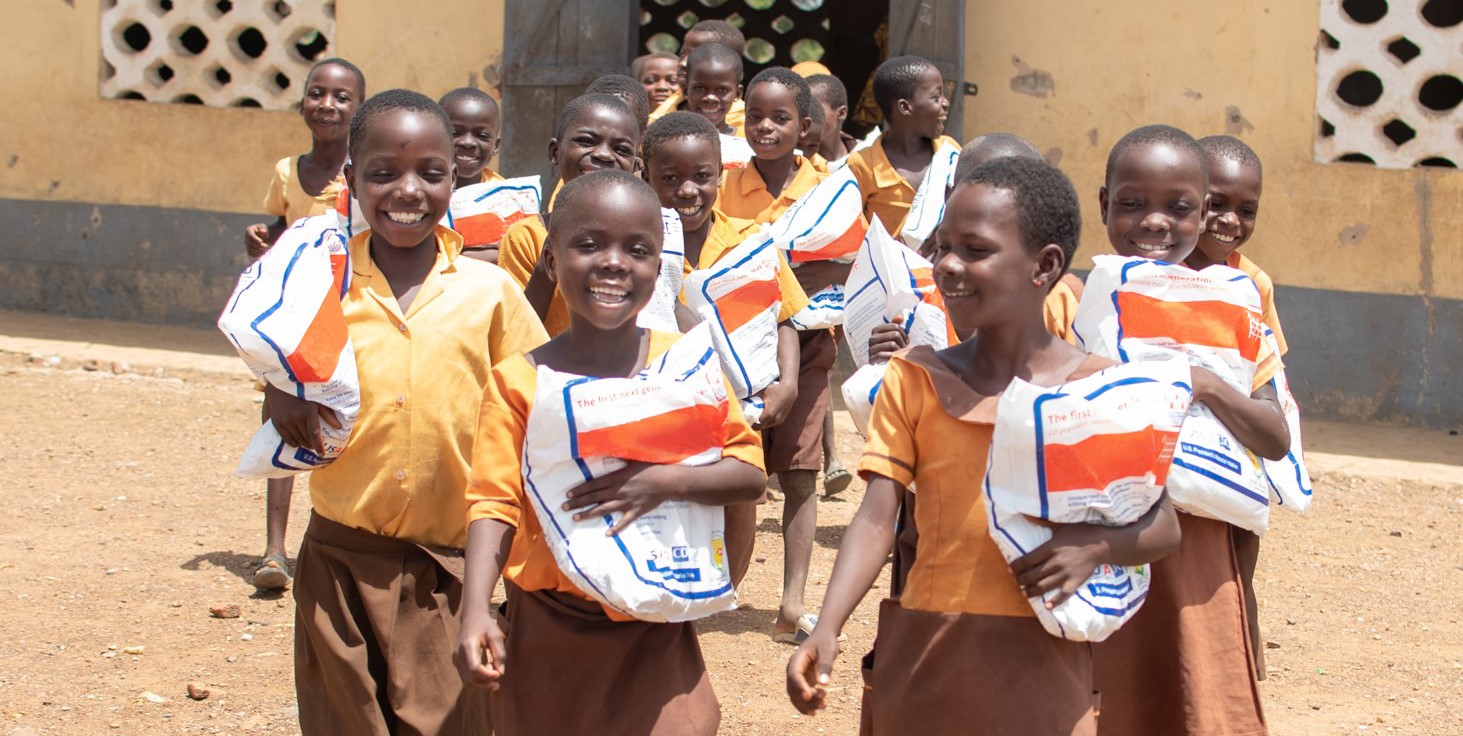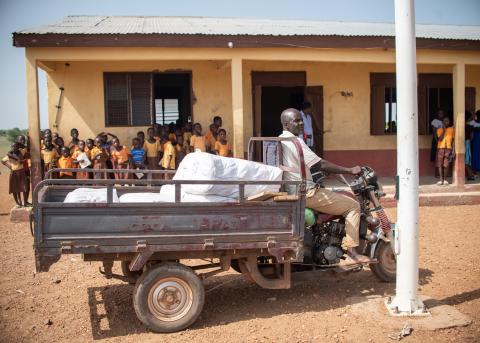Ghana is a large country with many schools in remote areas, including island communities. Working with 3PLs allowed the NMCP to outsource the distribution for a more efficient campaign. 3PLs regularly conduct business in the target local areas and know the type of transportation that will work to access these regions. They also have access to staff who are accustomed to working in different locations.

In Ghana, MOH partners with private logistics companies for mass distribution of long-lasting insecticide-treated nets to students
Over just two weeks in 2019, third-party logistics (3PL) partners in Ghana helped the Ministry of Health (MOH) distribute close to 1.5 million bed nets to students, enough to protect up to three million people in the students’ homes from malaria.
Every other year, Ghana's National Malaria Control Program (NMCP) and its partners conduct school-based mass distribution campaigns to promote the ownership and use of long-lasting insecticide-treated nets (LLINs) to prevent malaria. However, implementation was hindered by the public sector's limited staffing and transportation capacity to carry out such large, nationwide campaigns in the short time required. To complete the last step of the distribution, the NMCP had to have teachers leave the classroom, pick up LLINs from district offices, and bring them back to their students.
In 2019, the MOH and NMCP decided it was time for a change. Through the U.S. President's Malaria Initiative (PMI), the USAID Global Health Supply Chain-Procurement and Supply Chain Management (GHSC-PSM) project, supported the NMCP by bringing private-sector 3PL providers on board to alleviate the strain on public sector resources. The project leveraged the capacity and expertise of five carefully selected 3PLs to implement the campaign.

Private sector partners joined the distribution process from the port in Tema, a city on the Atlantic coast of Ghana, where they helped transport commodities from the privately managed warehouse to district holding points. Once the nets arrived in districts, 3PLs employed a variety of transport modes to deliver the nets to schools, including motor bikes, minivans, canoes, and donkey carts.
Staff from GHSC-PSM, the NMCP, 3PLs and other stakeholders deployed to the field to monitor the campaign’s progress. Over two weeks, 3PLs maintained constant communication with GHSC-PSM and other stakeholders and submitted regular updates to GHSC-PSM, who shared the information with the NMCP and partners. At the end of each day, GHSC-PSM consolidated the reports and, in collaboration with partners, determined needed interventions to resolve any distribution challenges.
“We have come to the warehouse to be part of the counting and loading. We have GPS on the trucks to monitor their movement, and we have personnel sitting in each truck to ensure we deliver and sign the proof of delivery. We provide on-time information where documents are scanned to us and posted on WhatsApp, which we also send to clients. At every point in time the client is kept abreast of what we are doing,” said Alfred Acheampong, CEO of Neomaxitide Company LTD.
The arrival of the nets was an exciting time for students. Teachers were in charge, but some students got to help unload and bring the bundles of nets into the schools. The teachers instructed students about proper use of the nets and distributed them in classrooms.
Delivering the nets directly to schools reduces the burden on teachers of carrying them from the district capitals, a strategy which also imposed a financial burden on the schools. “The children lose instruction hours because the teacher would spend time to go and get the nets and come back to the school," said Robert Ayinsinga, head teacher at Naaga Primary School.
Once delivered, parents aired out the nets and hung them over their beds, protecting family members when malaria-bearing mosquitoes are active at night.
At the end of the school day, eager students were ready to take the nets home. These are the supply chain heroes of this story, delivering nets the last mile—to their families.
“This afternoon, my daughter, Portia brought a mosquito net home from school. During the hot season we will tie it outside and sleep under it. This will enable her to go to school. I often rush my children to the hospital because of malaria, but this will be a thing of the past.”
Mrs. Abusanga, Mother of student recipient
By the end of the campaign, nearly 1.5 million pupils in 22,645 public and private schools received LLINs in less than a month. In addition, the project and NMCP realized several additional benefits from the public-private partnership:
- Uninterrupted teaching in schools
- Additional delivery validation using GPS and WhatsApp technology
- Reduced financial loss thanks to 3PLs’ insurance against theft or damage
- Payments to 3PLs were dependent on meeting delivery deadlines
- Optimized delivery routes and timelines
- Contribution to sustainable supply chain efforts by improving public-private partnerships
To get a better view of the hard work that goes into the successful delivery of LLINs in Ghana, view our photo essay and video that cover these shipments from our private-sector 3PL providers.